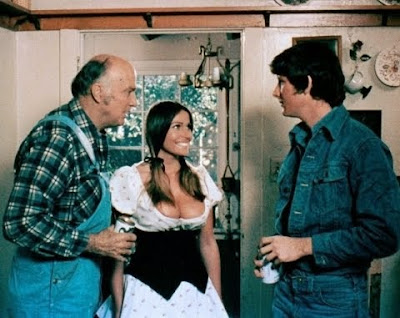Three Billboards Outside Ebbing, Missouri
Last year's THREE BILLBOARDS OUTSIDE EBBING, MISSOURI is one of the most wildly improbable films I've seen in some time. Scene after scene features actions that would certainly incur far worse repercussions than what comes down here. People firebomb police stations, set things ablaze, force a drill into a dentist's finger, and throw others out of windows with what I considered to be minimal consequences. Additionally, characters seem to change overnight. By the way, these thoughts are not a damnation, invisible audience.
The film has as its premise an angry woman who rents three unused billboards on a lonely road to directly question the town's chief of police as to why there have been no arrests made following the rape and murder of her daughter - seven months earlier. It's a plausible set-up, with a multitude of plot development possibilities. It sounds wild enough to be true, and I've read that writer/director Martin McDonagh based his screenplay on actual billboards about unsolved crimes he observed in the American South. A cursory glance of your local newspaper's police blotter will reveal strange things, but somehow when unusual events (and behaviors) are presented in a movie that is appearing to attempt to create a very credible environment, it feels non-organic. Stranger than fiction may not play well within fiction.
I don't think McDonagh is going for realism, not in the macro sense, anyway. Some viewers have compared THREE BILLBOARDS to the writings of Flannery O'Connor, whose Southern Gothic style was often deemed ugly and unflinching. I agree with this comparison as many similar themes are explored. The most obvious: forgiveness and redemption. There are numerous scenes exemplifying both, moments where the expected violent response is instead a small gesture of kindness, not always entirely believable, but maybe McDonagh's a romantic and an optimist at heart. Such moments come later, however. Prior, the film's characters are consumed by their rage and act accordingly.
There's Mildred (Frances McDormand, who took home a well deserved Oscar), whose grief has largely morphed into anger, though she still has crippling moments of anguish (including that iffy scene with the deer). Her decision to purchase the billboards is not popular with anyone, including her own son. Sam Rockwell, who also earned a statue for his work, is a local cop named Jason, a racist, homophobic half-wit who is usually pissed off - a lethal combination. Woody Harrelson plays Chief Willoughby, the target of Mildred's bitter campaign. He is not so hacked off, and is in fact also not as bent over the billboards as everyone else in Ebbing. Willoughby's a father of two young girls, and perhaps has a particular understanding of the frustrations of unsolved cases and grieving relatives. But we'll learn there is a more immediate, pressing reason for his calm demeanor.
THREE BILLBOARDS succeeds in its explosiveness, its anger toward injustice. But it's also crazily effective as a sort of gritty rural poem on longsuffering. It is laugh out loud funny at times, even during otherwise horrific scenes. Striking such a balance is one of Martin McDonagh's greatest achievements with this picture.



Comments